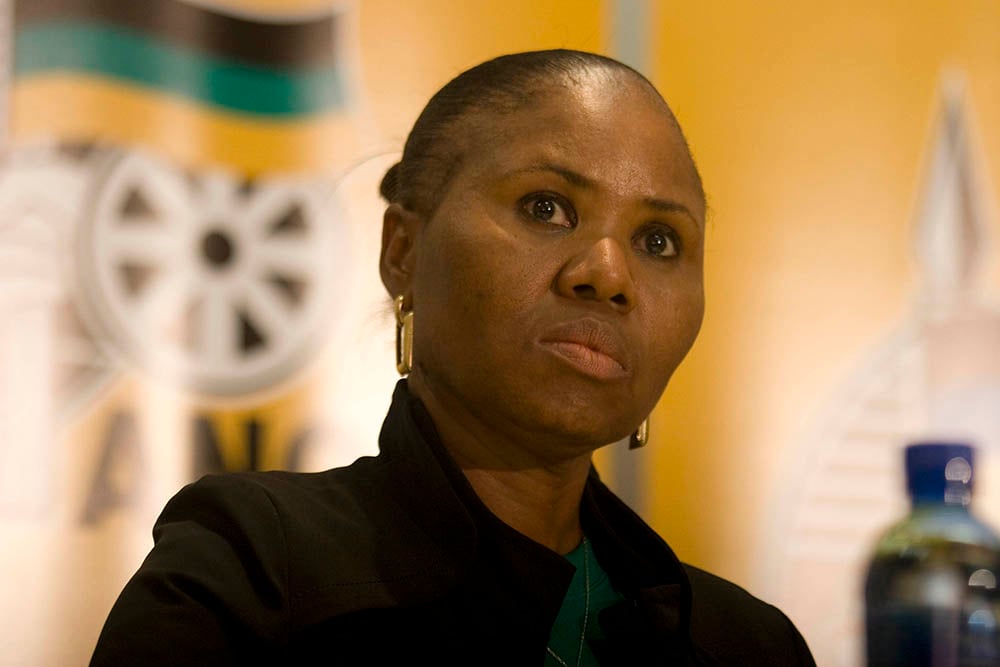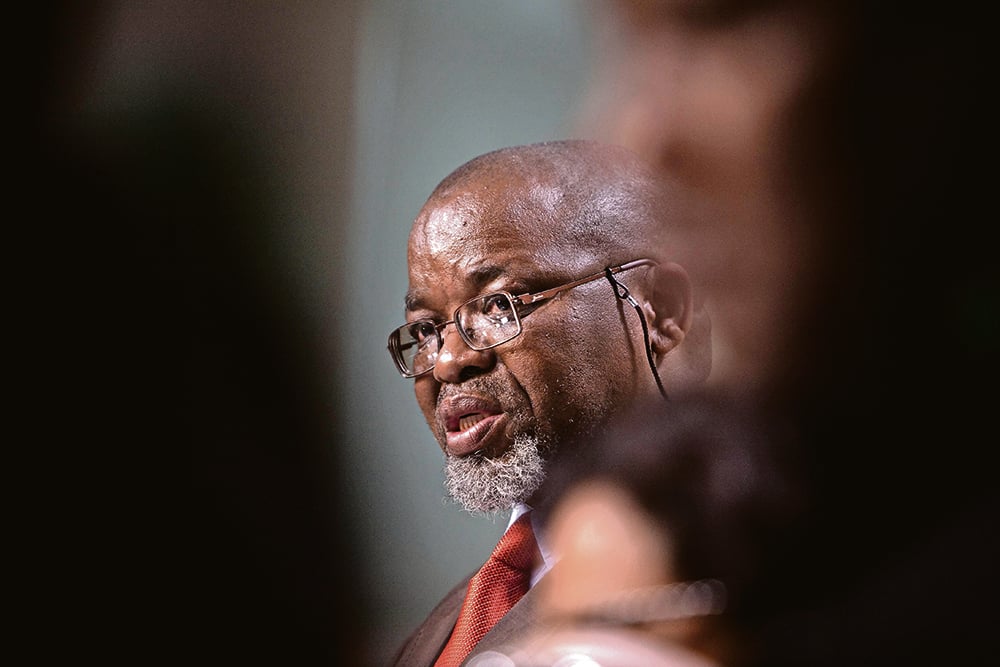Randall Carollissen is currently the Group Executive: Revenue Planning, Analysis and Reporting at the South African Revenue Services. He is also the chair of the Council of the University of the Witwatersrand. (SABC)
Small Business Minister Lindiwe Zulu has come out with guns blazing in defence of Jacob Zuma, claiming business leaders manipulated global markets in an attempt to topple the president.
She is supported by others in the ANC who believe that those responsible will have to face the consequences of their failed coup.
This follows President Jacob Zuma firing the well-respected Nhlanhla Nene as finance minister last week and appointing an unknown backbencher, Des van Rooyen, in his place. Four days later, the president was forced to replace Van Rooyen with previous finance minister Pravin Gordhan, following a meeting with business leaders.
But those in business who were in talks with the government following the ensuing market chaos are loath to admit they were even peripherally involved.
The growing feeling emerging among Zuma supporters is in stark contrast with the views of the thousands of marchers who turned out on the streets on Wednesday calling for Zuma to go, and who believe the president either sabotaged the economy out of ignorance, or in the pursuit of opportunities to dispense patronage.
“Business wrote off President Zuma a long time ago. They [have] long decided this is the person they don’t want. Unfortunately, they wrote off a man who is the future,” said Zulu, also an ANC national working committee (NWC) member, in an interview with the Mail & Guardian this week.
Had the business community rallied around Zuma following the appointment of Van Rooyen, as they were obliged to do, all would have been well, she said.
Zulu is a particularly vocal supporter of Zuma, but her views are widely shared.
An ANC leader and former senior government official, who asked to remain anonymous, accused the business sector of colluding with some people in the ANC and government to damage Zuma.
“The anti-JZ offensive is in overdrive but will not succeed. My reading of the situation is that this is a campaign driven internally within the ANC and government.
“The global economic conditions have been manipulated to drive a political agenda and markets fell to this folly. Unfortunately the markets have allowed themselves to be used and effectively taken political sides.”
Zulu said the ANC was reaching out to business. She cited the invitation to business to make a contribution to the ANC’s discussion documents on economic policy during the recent national general council meeting as an example of the party being willing to work with business.
She said it was not true that there was no trust between the ANC and business. “The ANC has never not understood the role of business. But business is not reaching out. They need to be in constant conversation with the ANC.”
The M&G understands the ANC was forced to put pressure on Zuma to reconsider his decision on Van Rooyen’s appointment after a warning by major South African institutions that investors were pulling out of the country and that the situation was likely to get worse if no drastic measures were taken.

Lindiwe Zulu came out in strong support of Zuma. (Photos: Oupa Nkosi, M&G)
This week, many with knowledge of the events referred to a group who drove discussions with the government simply as “the bankers”.
But some of the parties involved have gone to great lengths to keep their interaction with the government out of the limelight.
Bobby Godsell, of Business Leadership South Africa and a former member of the National Planning Commission, wouldn’t even admit to having been at a meeting with the government at the weekend.
“I am not going to go there,” he said when asked about that meeting.
A source close to the group involved in the meeting said “the bankers” had explained to the ANC team “what the public knows already” – what a negative impact the decision to appoint Van Rooyen would have on the markets. This included likely further downgrades by the ratings agencies and the effect this would have on the banking industry in particular.
The plan to rescue the situation with the appointment of Gordhan did not come from “the bankers”, another source said. “That was, in fact, the suggestion of [Minister in the Presidency] Jeff Radebe … he produced the name of Pravin.”
He asked them if it “would make a difference”.
The bankers responded: “Yes, indeed, that would make a good start,” according to the source.
The business group believe that a decision to appoint Gordhan had already come from within the ANC before they met Radebe and his team. But exactly what – and who – was behind the decision remains a mystery.

ANC secretary general Gwede Mantashe has been noticeably silent.
Zuma’s apparent failure to consult the ANC’s top brass on the appointment of Van Rooyen seems to have deepened tensions between him and other senior ANC officials, including its secretary general, Gwede Mantashe, and the party’s deputy president, Cyril Ramaphosa.
Neither could be reached for comment this week, but neither has come out publicly to defend Zuma’s decisions or actions since the chaos started, and their “truancy” has been noted within the ANC.
Mantashe was particularly conspicuous by his absence during the ANC’s briefing following its NWC meeting in Johannesburg on Tuesday.
The ANC’s spokesperson, Zizi Kodwa, told journalists that Mantashe was away in north Sahara, but party insiders said it had been strongly suggested to Mantashe that he should not be part of the media briefing.
“The fear was that he might not have been able to contain his anger. It was decided [ANC deputy secretary general] Jessie Duarte must address the briefing. He is at the point where he is prepared to square up with Number One [Zuma].
“I know Gwede does not want to be undermined. He feels the same treatment that Kgalema Motlanthe [former deputy president] suffered when he was ANC secretary general and Thabo Mbeki was president.
“You can see he [Mantashe] does not speak with authority any more. He is getting impatient with Zuma’s conduct. How do you defend this kind of decisions in public?” said one party insider.
The government insider said Ramaphosa felt as frustrated as Mantashe about his relationship with Zuma.
“He [Ramaphosa] has been struggling to secure a private meeting with the president for the last seven months. The team in his [Ramaphosa’s] office say the two have not been meeting to discuss key issues. It’s [the relationship] worse now that Cosatu has endorsed him [Ramaphosa] as its candidate to succeed him as ANC president.”
Some of Ramaphosa’s supporters, mainly the communists in the ANC-led alliance, hope to see Mantashe elected as his deputy at the ANC’s national conference in 2017.
Duarte this week poured cold water on reports that Zuma’s decision to reappoint Gordhan came after Ramaphosa threatened to resign as deputy president, as rumoured.
“He [Ramaphosa] has been working closely with us since last Thursday. He was with us last night and on Sunday, and when the president accepted an indication that change was needed,” said Duarte.
In the interview, Zulu said, if there were people in the ANC who wanted to recall Zuma, they were in the minority.
“The balance of power is supporting President Zuma. If there are people who think the president is going to be recalled, it is not going to happen. Those from within have no chance,” said Zulu.
Big business groups this week continued to issue bland and carefully-worded statements wildly out of tune with the chaos in the markets.
According to one source, this was part of a concerted strategy not to “rattle the cage in public” and to retain influence behind the scenes.
A previous version of this article incorrectly quoted Minister Zulu stating that “The ANC has never understood the role of business.” The line should have read: “The ANC has never not understood the role of business.” The article was corrected online on December 18 2015. The M&G apologises for the error.